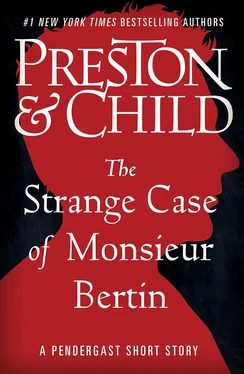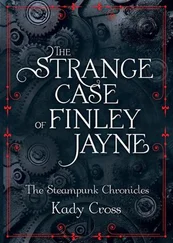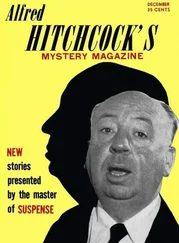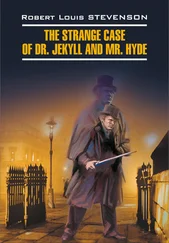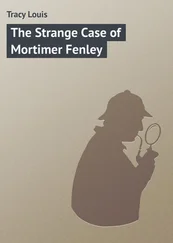Lincoln Child - The Strange Case of Monsieur Bertin
Здесь есть возможность читать онлайн «Lincoln Child - The Strange Case of Monsieur Bertin» весь текст электронной книги совершенно бесплатно (целиком полную версию без сокращений). В некоторых случаях можно слушать аудио, скачать через торрент в формате fb2 и присутствует краткое содержание. Город: New York, Год выпуска: 2019, ISBN: 2019, Издательство: Grand Central Publishing, Жанр: Триллер, на английском языке. Описание произведения, (предисловие) а так же отзывы посетителей доступны на портале библиотеки ЛибКат.
- Название:The Strange Case of Monsieur Bertin
- Автор:
- Издательство:Grand Central Publishing
- Жанр:
- Год:2019
- Город:New York
- ISBN:978-1-5387-1758-5
- Рейтинг книги:3 / 5. Голосов: 1
-
Избранное:Добавить в избранное
- Отзывы:
-
Ваша оценка:
- 60
- 1
- 2
- 3
- 4
- 5
The Strange Case of Monsieur Bertin: краткое содержание, описание и аннотация
Предлагаем к чтению аннотацию, описание, краткое содержание или предисловие (зависит от того, что написал сам автор книги «The Strange Case of Monsieur Bertin»). Если вы не нашли необходимую информацию о книге — напишите в комментариях, мы постараемся отыскать её.
The Strange Case of Monsieur Bertin — читать онлайн бесплатно полную книгу (весь текст) целиком
Ниже представлен текст книги, разбитый по страницам. Система сохранения места последней прочитанной страницы, позволяет с удобством читать онлайн бесплатно книгу «The Strange Case of Monsieur Bertin», без необходимости каждый раз заново искать на чём Вы остановились. Поставьте закладку, и сможете в любой момент перейти на страницу, на которой закончили чтение.
Интервал:
Закладка:
“The viewing will be closing,” the funeral director said to Pendergast in a low voice. “Perhaps you should leave now. I’ll let the lady in the back sit a few more minutes, then escort her to the door myself.”
Pendergast nodded. “Most kind.”
Out on the street, Constance turned to Pendergast. “Well, did you satisfy yourself that he was really and truly dead? The way you were inspecting his person, I thought you were about to have him turn his head and cough.”
Pendergast raised an eyebrow. “Forgive me for mortifying you like that — no pun intended. I was looking for evidence that Monsieur Bertin might have been the victim of foul play.”
“And?”
“I saw nothing unusual.”
“What, may I ask, made you think he might have been murdered?”
“You may be amused to hear this, but when I first opened that death notice, I felt a sudden chill in the library — as if caused by the brief passing of a spirit. And as you pointed out, the lack of a return address on the notice was abnormal.”
“I wonder who else got the notice?”
“As do I.” Pendergast was silent a moment, as motionless as he had been back in the funeral parlor. “But it appears my suspicious nature has been overactive and I shall let it go. Forgive me, Constance; I have been in this disgraceful business too long.”
But, as Constance soon discovered, Pendergast did not let it go. Instead of returning to their suite in the Pontchartrain Hotel, Pendergast insisted on paying a visit to Monsieur Bertin’s doctor, an old Dutch fellow with the unpronounceable name of TenSpoecke who operated out of a ground-floor office in the French Quarter. The doctor was in — he didn’t seem to have many patients — and they were ushered into a consultation room that looked more like a fortune-teller’s parlor than a doctor’s office, with lampshades draped in tasseled silk, Persian rugs, and heavy Victorian furniture.
“I last saw him only a month ago,” the doctor said, seating himself neatly in a massive wing chair, a white doctor’s coat worn over an expensive and beautifully cut suit. “He was in his usual health, which, I’m sorry to say, was not good. He had angina, he was overweight, and he resolutely refused any alteration of diet or exercise. Exercise, in particular, was abhorrent to him — he refused to get on a treadmill even long enough to perform a stress test. And that codeine he was so enamored of — when he could get it — certainly did no good to his heart.”
“Did you examine the body?” Pendergast asked.
“Yes, indeed. I was called in to the morgue to sign the death certificate. Death by heart failure, precipitating factor atherosclerosis.”
“No autopsy?”
“My dear Mr. — Pendergast, was it? A private autopsy costs fifteen thousand dollars. The authorities had no interest in looking into the matter. And rightly so, there was absolutely no need, not the whiff of suspicion of anything beyond simple heart failure.”
As they climbed back into the limousine, Constance turned to Pendergast. “Satisfied, Aloysius?”
“Am I ever satisfied?”
The Metairie Cemetery was an amazing place, Constance thought as they walked along rows of spectacular marble tombs and mausoleums, statues of weeping angels and cherubs, Christs on crosses, saints in various drooping postures, men on horseback, and even a miniature Egyptian pyramid with a sphinx. All in all, she thought, a pleasant spot to spend an afternoon among the resting dead.
“This is one of the finest cemeteries in New Orleans,” Pendergast told her, “famous for its extravagant sepulchres. Much of the cream of New Orleans society was interred here, in aboveground tombs due to the high water table. As you know,” he continued after a moment, “my own people were buried under the manse on Dauphine Street, in a lead-lined catacomb fashioned by my ancestors almost two centuries ago.”
“No doubt they found the idea of mingling the Pendergast dead with strangers to be disagreeable.”
“Precisely.”
They arrived at the grave site, which was in a newer, more modest section of the cemetery, prepared with Astroturf laid down around the open hole. The mahogany casket with its gleaming brasswork sat in position over the gaping grave, on a lowering machine. The pleasant weather had given way to leaden skies and a winter drizzle. The elderly priest in his vestments stood to one side, Bible in hand, with an assistant holding an umbrella over his head, next to a man Constance presumed to be the cemetery director. The only other people at the graveside were two attendants — and the lady in black from the funeral home, standing in the drizzle.
At the appointed hour, the priest, after looking around as if surveying a vast crowd in attendance, began the service. He read the standard passages from the Bible in a tenor voice with a fine quaver, a bit cracked from age. Constance noticed that as the service progressed, several limousines and town cars with smoked windows eased past along the adjacent graveled path, pausing for a moment as if to pay respects. One such car stopped and the windows went down, revealing a group of elderly gentlemen, who crossed themselves multiple times. Then the windows went up again and the car drove on.
When the priest finished, one of the attendants released the brake of the lowering device, and with the humming of gears the casket descended slowly into the hole and at length disappeared. A moment later, when the device stopped, the attendants slid out the nylon webbing straps and laid them aside.
The priest said a prayer, then tucked a silver trowel into a pile of dirt, tossing some in while intoning: “We therefore commit his body to the ground; earth to earth, ashes to ashes, dust to dust; in sure and certain hope of the Resurrection to eternal life, through our Lord Jesus Christ; who shall change our vile body, that it may be like unto his glorious body.”
Constance listened attentively to the old words. It was the first burial she had witnessed since she was a child — during the smallpox epidemic that ravaged New York — and that had been a hurried and tragic event that she did not care to remember.
And then it was over. The priest closed the Bible, handed it to his assistant, and — as the attendants began filling in the grave — approached Pendergast and Constance. He held out his hand. “You must be Aloysius Pendergast,” he said, shaking. “I know something of you and your old family. Gaspard spoke highly of you, and often. I am Father Fazande.”
Pendergast inclined his head. “I’m most pleased to meet you, Father. Monsieur Bertin tutored me and my brother, Diogenes, when we were children.”
“What an interesting tutor he must have been.”
“He was certainly eccentric. In addition to history, mathematics, biology, and Latin, he introduced us to all kinds of peculiar things — the natural sciences, the heavens, anatomy, medicine, even ciphers and codes. He had an old Jefferson disk, a sort of wooden cylinder with letters on it for coding messages. Diogenes and I spent hours sending each other secret missives.”
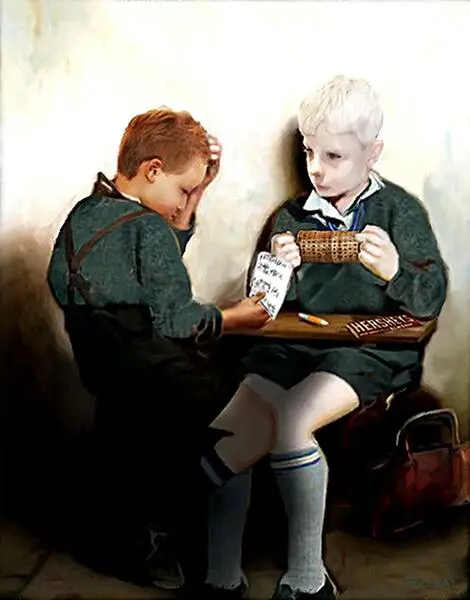
“He always told me you were his favorite. He did not speak of Diogenes much, except to note that over time the boy’s interests became rather... discursive. Where is your brother now?”
“He perished in a house fire in the Florida Keys.”
“Oh, dear Lord. Another house fire.” The priest frowned and shook his head. “I’m so sorry for your loss.”
“Thank you.”
There was a slightly awkward silence. Then the priest said, “I hope Gaspard didn’t neglect your religious education.”
Читать дальшеИнтервал:
Закладка:
Похожие книги на «The Strange Case of Monsieur Bertin»
Представляем Вашему вниманию похожие книги на «The Strange Case of Monsieur Bertin» списком для выбора. Мы отобрали схожую по названию и смыслу литературу в надежде предоставить читателям больше вариантов отыскать новые, интересные, ещё непрочитанные произведения.
Обсуждение, отзывы о книге «The Strange Case of Monsieur Bertin» и просто собственные мнения читателей. Оставьте ваши комментарии, напишите, что Вы думаете о произведении, его смысле или главных героях. Укажите что конкретно понравилось, а что нет, и почему Вы так считаете.
